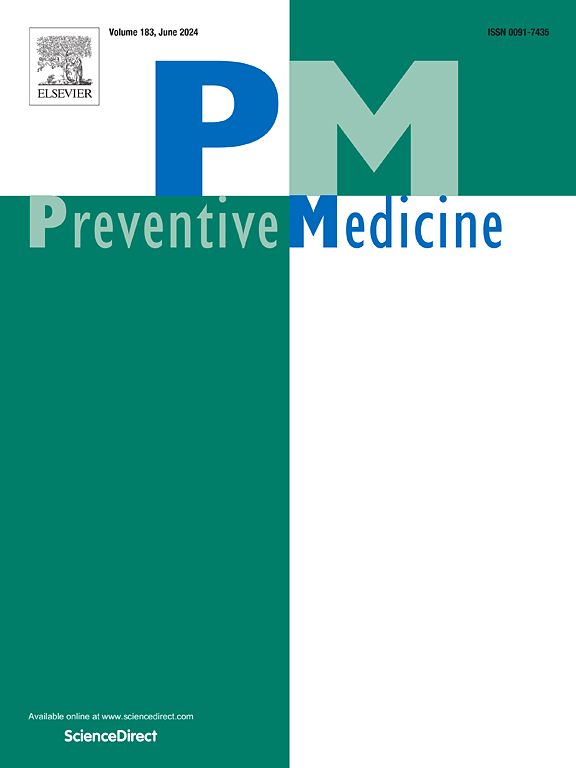从预防角度构思社会处方服务的框架。
IF 4.3
2区 医学
Q1 MEDICINE, GENERAL & INTERNAL
引用次数: 0
摘要
目的:社会处方模式正在全球范围内扩展,以实现多种目标,例如关注影响人们健康的社会状况、为有精神健康问题或其他长期疾病的患者提供支持、促进社区建设以及减少对医疗保健系统的需求。隐含的意思是,许多社会处方服务旨在促进健康、预防发病或疾病恶化。鉴于目前的科学文献并没有系统地将这些服务作为预防性服务模式,我们提出了一个框架,从预防的角度来明确社会处方的概念:方法:基于预防科学的概念(如预防方法的分类)以及对不同国家社会处方模式的比较,我们编制了一个框架,以便从预防的角度对社会处方进行概念化、规划和评估。通过系统回顾和重点关键词搜索,我们确定了社会处方模式的范例:结果:我们的框架概述了明确设计社会处方模式用于预防目的的系统过程。它包括以下步骤:确定目标人群(如有轻微精神健康问题的年轻人)、制定预期结果(如改善社会参与)、确定预防方法(如普遍预防或指定预防)、决定实施环境(如初级或专门护理)以及选择处方服务(如户外体育活动):结论:该框架通过指导社会处方服务的概念化、开发和评估,推动了该领域的发展。它有助于拓宽社会处方的可能范围,并考虑到潜在的不良后果。因此,该框架为作为预防性服务模式的社会处方开辟了新的途径。本文章由计算机程序翻译,如有差异,请以英文原文为准。
A framework to conceptualize social prescribing services from a prevention perspective
Objective
Social prescribing models are expanding worldwide to serve multiple goals, such as attending to social conditions that affect people's health, supporting patients with mental health issues or other long-term conditions, facilitating community building and reducing demands on the health care system. Implicitly, many social prescribing services seek to promote health, prevent morbidity or deterioration of disease. Given that the scientific literature currently does not systematically describe these services as preventive service models, we propose a framework to explicitly conceptualize social prescribing from a prevention perspective.
Methods
Based on concepts from prevention science (e.g., classifications of prevention approaches), and a comparison of social prescribing models in different countries, we compiled a framework allowing to conceptualize, plan and evaluate social prescribing from a prevention perspective. Examples of social prescribing models were identified using systematic reviews and focused key-word-searches.
Results
Our framework outlines a systematic process for explicitly designing social prescribing models for prevention purposes. It consists of the following steps: defining target populations (e.g., young people with mild mental health issues), formulating intended outcomes (e.g., improved social participation), determining a prevention approach (e.g., universal or indicated prevention), deciding on the implementation setting (e.g., primary or specialized care) and selecting services for prescription (e.g., physical activity outdoors).
Conclusion
The framework advances the field by guiding the conceptualization, development and evaluation of social prescribing services. It contributes to widening possible settings for social prescribing and considers potential adverse consequences. Thereby the framework opens up new avenues for social prescribing as preventive service model.
求助全文
通过发布文献求助,成功后即可免费获取论文全文。
去求助
来源期刊

Preventive medicine
医学-公共卫生、环境卫生与职业卫生
CiteScore
7.70
自引率
3.90%
发文量
0
审稿时长
42 days
期刊介绍:
Founded in 1972 by Ernst Wynder, Preventive Medicine is an international scholarly journal that provides prompt publication of original articles on the science and practice of disease prevention, health promotion, and public health policymaking. Preventive Medicine aims to reward innovation. It will favor insightful observational studies, thoughtful explorations of health data, unsuspected new angles for existing hypotheses, robust randomized controlled trials, and impartial systematic reviews. Preventive Medicine''s ultimate goal is to publish research that will have an impact on the work of practitioners of disease prevention and health promotion, as well as of related disciplines.
 求助内容:
求助内容: 应助结果提醒方式:
应助结果提醒方式:


